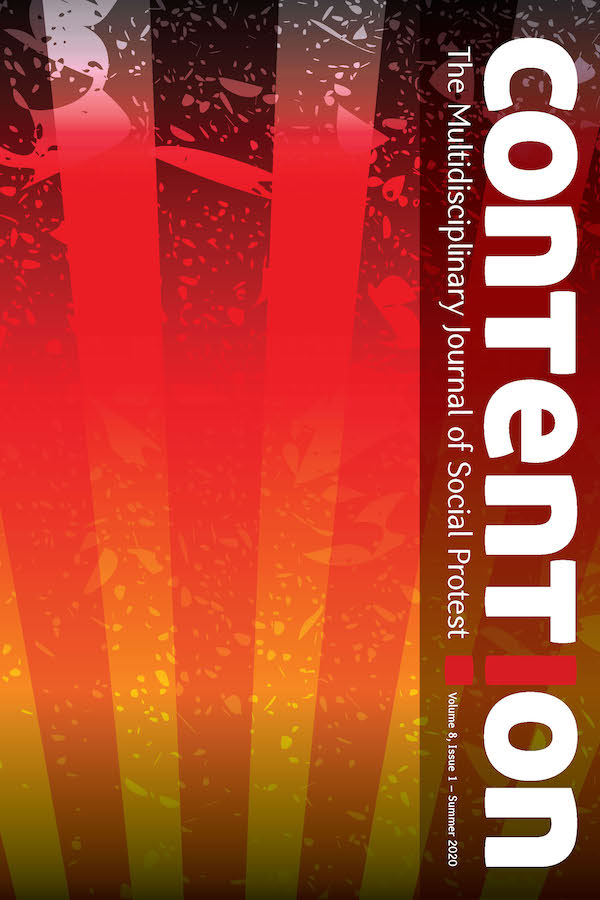
Contention
The Multidisciplinary Journal of Social Protest
ISSN: 2572-7184 (print) • ISSN: 2330-1392 (online) • 2 issues per year
Editors:
Benjamin Abrams, University College London
Giovanni A. Travaglino, Royal Holloway, University of London
Subjects: Protest Movements, Social Movements, Social Theory, Political Theory
Latest Issue
Volume 13 Issue 1
Moral Shocks, Backlash Protest, and Critical Junctures
Examining the Conditions and Effects of Transformative Events
Research on transformative events shows that blatant acts of violence are often followed by moral shocks that raise such a sense of public outrage that formerly contention-averse audiences take to the streets. Yet, despite abundant research on moral shocks, backlash, and critical junctures, their interconnection remains unexplored. Studies of transformative events overwhelmingly concentrate on the properties of repression to explain backfire dynamics, while the affective and discursive features of events that alter the course of history are largely understudied. This special issue addresses this gap through a range of contributions that shift the focus of attention from the structural features of violent events to the competition over their meaning, their cultural and temporal situatedness, and the subjective and objective conditions of backlash protest.
Multilayered Contingencies of Transformative Events
Civil Resistance and Regime Interactions in 1980s Northern Somalia
This article examines nonviolent resistance and backfire dynamics in 1980s northern Somalia through an event-centric lens, exploring why repression sometimes escalates dissent rather than suppressing it. Drawing on over one hundred interviews, it unpacks the interplay between two transformative events driven by distinct actors, emphasizing small-scale strategic interactions and contingencies. The study underscores three underexplored dimensions: moral-cultural factors, informal networks, and global power dynamics. It calls for future research to adopt more multilayered and dynamic perspectives on repression, resistance, and transformative events.
Who's to Blame?
Discursive Constraints on Backfire after Violent Protests
Drawing upon the example of the violent protests against the 2017 G20 summit in Hamburg, this article analyzes how protest events may impact policy debates if these events allow for multiple, potentially conflicting interpretations. Designed as within-case analysis, this study examines the evolution of framings and discursive strategies deployed in debates about police identification requirements. Although the proponents of policy change seized the protests as an opportunity to rationalize policy change, the opponents discursively constrained the debates by deploying a framing strategy that resulted in a shift in “discursive opportunity structure” and “feeling rules,” thus hindering the backfiring of police violence. The results indicate that in cases in which the attribution of violence is contested, transformative events may both open and preclude opportunities for change.
From Repression to Participation?
How Violent Tactics in Nonviolent Campaigns Influence Backfire
To what degree do violent tactics in otherwise nonviolent campaigns reduce the likelihood of a participation surge after repression? While repression can suppress or stimulate participation, research rarely examines how specific violent tactics shape this dynamic. I argue that violence disrupts the backfire mechanism, shifting public support toward the state. When repression targets violent protesters, it appears more legitimate and proportionate, reducing public outrage and participation. More destructive tactics intensify this effect. By distinguishing between unarmed, semiarmed, and armed actions, I propose that increasing violence progressively weakens backfire and further reduces participation surges. Evidence from major African nonviolent campaigns (1990–2006) supports these hypotheses, drawing on descriptive statistics and within-case comparisons of event sequences.
Moral Shocks and (De)mobilization
The Case of the Palestinian Liberation Movement
What are the organizational consequences of moral shocks? Moral shocks are events or critical junctures that spark “visceral reactions against a reprehensible reality” (